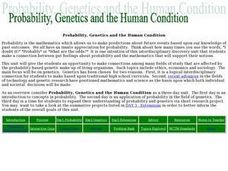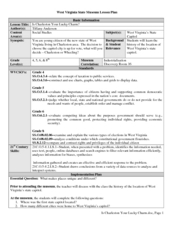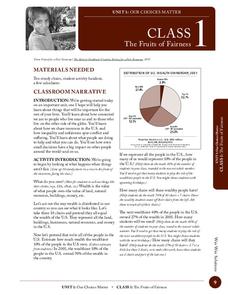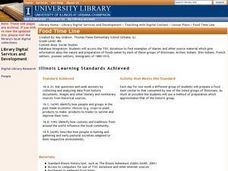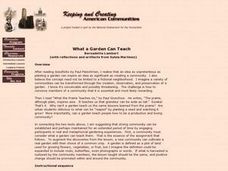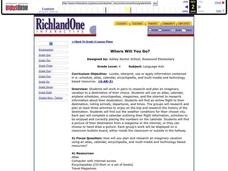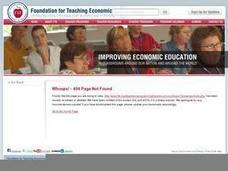Curated OER
The Talk Show: A Bioethical Dilemma About Neurological Disorders
Students explore neurological societal problems. They research, collect information and assess the ramifications of ethical, economic, political, and social issues. During a talk show simulation, students present their decisions.
Curated OER
Self-Assessment
Students take a personal inventory about behaviors. They determine if there are risky behaviors present that could be harmful. The inventory is used to help students examine how to make healthy decisions.
Curated OER
The Great Depression - FDR and the New Deal
Young scholars consider the role that government should play in economics. For this Great Depression lesson, students analyze New Deal legislation to develop an informed opinion about the public programs and then present their findings...
Curated OER
Fishing Game: Stella PC and Mac
Students play The Fishing Game as a manager in the national fish and wildlife service charged with the responsibility of making policy suggestions regarding the management of a fishery surrounding national borders.
Curated OER
The Immigrant Experience
Students utilize oral histories to discover, analyze, and interpret immigration and migration in the history of the United States. A goal of the unit is fostering a discussion and encouraging students to make meaning of the bigger...
Curated OER
The Great Kapok Tree
Students read The Great Kapok Tree by Lynne Cherry. After reading the story, they center on the controversy of destroying the rain forest or conserving it. Students have to make an informed decision about rain forest destruction.
Curated OER
Probability, Genetics and the Human Condition
Students explore the concept of probability as it relates us to be able to make predictions about future events based upon our knowledge of past outcomes. They have an innate appreciation for probability. Students make a connection...
Curated OER
The Alien and Sedition Acts
Young scholars discover the conflicts that arose between the political parties over issues of foreign policy and economics. Using the Internet, they research the Alien and Sedition Acts and how they relate to the U.S. Constitution. They...
Curated OER
The Big Book of Judgment
Students make a book to learn about judging fairly and practicing fairness. For this judgment lesson, students discuss judgment and fairness by defining the words. Students assemble a book for the terms.
Curated OER
Is It an Authentic Gutenberg Bible?
Sixth graders conduct Internet research to determine what makes Gutenberg Bible authentic, view Ransom Center's digitized version of Gutenberg Bible, and create Powerpoint presentation supporting research findings.
Curated OER
Is Charleston Your Lucky Charm?
Students determine what makes Charleston, West Virginia unique. In this West Virginia history lesson, students explore the West Virginia History Museum to identify why Charleston became the capitol of the state.
Curated OER
Second Star To the Left and Straight On 'Till Morning" - Spreadsheet Driven Exploration of Pacific Asian Geography
Students explore the geography of Pacific Asia. The class is divided into two groups to participate in a role-play activity where they act as European explorers. Students utilize mathematics, spreadsheet and internet technology to make...
Curated OER
The Fruits of Fairness
Students examine the distribution of wealth in the US. In this economic distribution lesson, students use math skills to apply real statistics to the students in their classroom making these facts more of a reality.
Curated OER
The Gulf Oil Disaster
Students take a closer look at the Gulf oil spill of 2010. In this global issues lesson, students analyze political cartoons related to the crisis. Students discuss their impressions of the crisis and U.S. energy policies.
Curated OER
Give Me the C and D Canal!!!
Students estimate the distance between Baltimore to Philadelphia via the water route before the Chesapeake and Delaware Canal was built. They familiarize themselves with canals and how transporation and economic necessities dictate the...
Curated OER
Food Time Line
Fourth graders make a timeline to include the immigrants of 1880-1910. Then, in groups, they research foods consumed, purchase, and serve it to the class.
Curated OER
Lesson Plan on Wants and Needs
First graders examine and discuss the difference between what they need to live and what they want. They examine pictures from magazines and newspaper ads, distinguishing between whether they are wants or needs.
Curated OER
Winter Lights: A Season In Poems & Quilts
Students read the book Winter Lights: A Season in Poems & Quilts and do language arts and math activities that go with the book. In this language arts and math lesson plan, students read the book given and do activities that include...
Curated OER
Food, Meals, and Cooking
Students examine the eating habits of people in other countries and learn new vocabulary. They also practice using nouns and the passive voice.
Curated OER
3-in-1 Color Tool
Students use a new tool to help them be more creative in designing their quilts. After watching a demonstration, they design their own color combinations and select the fabric for their quilt. They reiew the color wheel and warm and...
Curated OER
Consumer Society
In this consumer society activity, students think about where and why they buy goods and the difference between needs and wants. Students read a text and answer 30 varied questions.
Curated OER
What a Garden Can Teach
Students read about land and gardening and create found poems from the text. They use the poems to design interpretation quilts of communal text.
Curated OER
Where Will You Go?
Fifth graders research and plan an imaginary vacation. In this travel planning lesson, 5th graders work in pairs to use an atlas, calendar, review airplane schedules, encyclopedias, magazines, and the Internet to research information...
Curated OER
A Proper Role for Government - Seeking Perfection in an Imperfect World
Students discuss the proper role of government in the economy. Reviewing the foundations for a market economy to work properly, they decide how to best direct resources to get the most out of them. They distinguish between private and...








